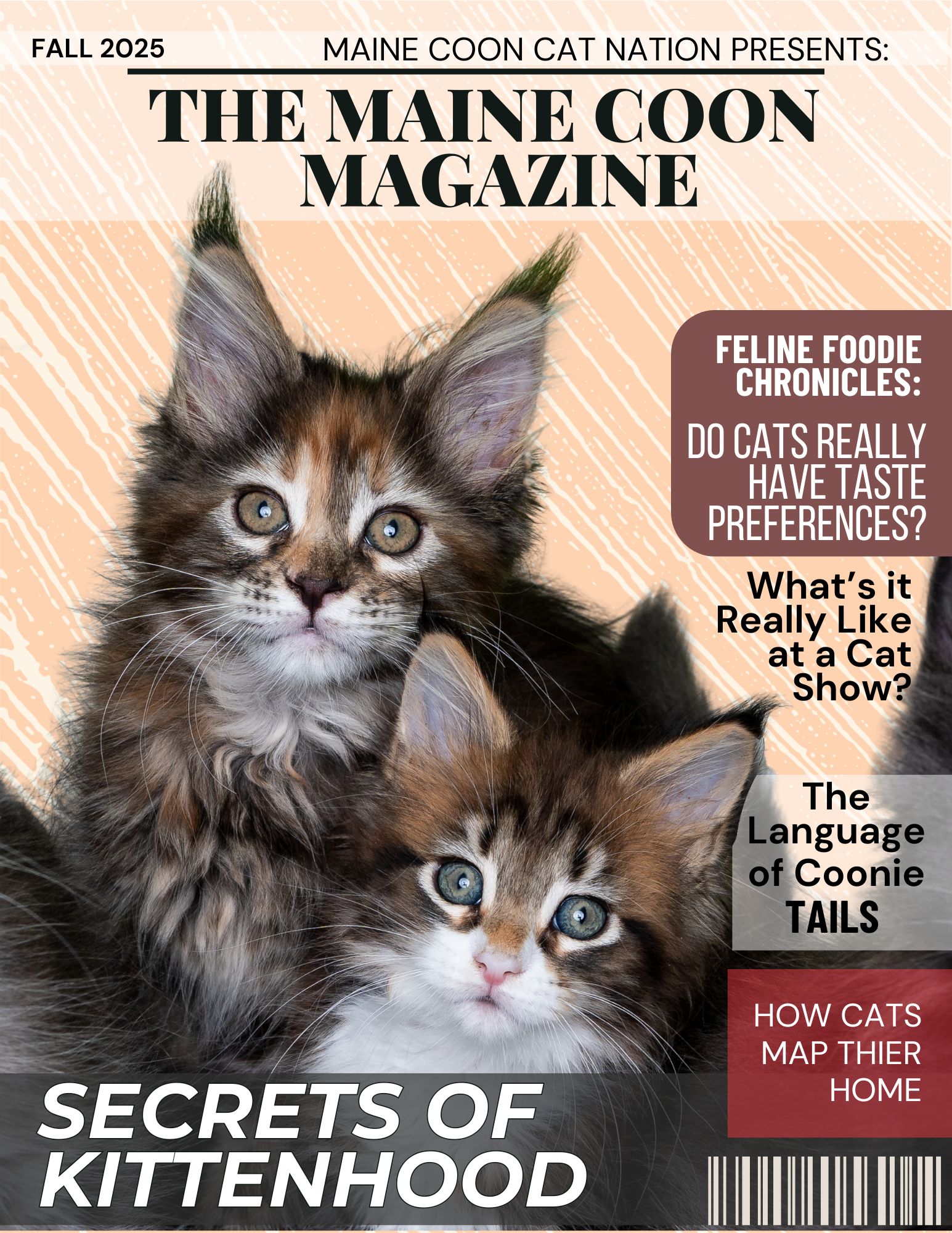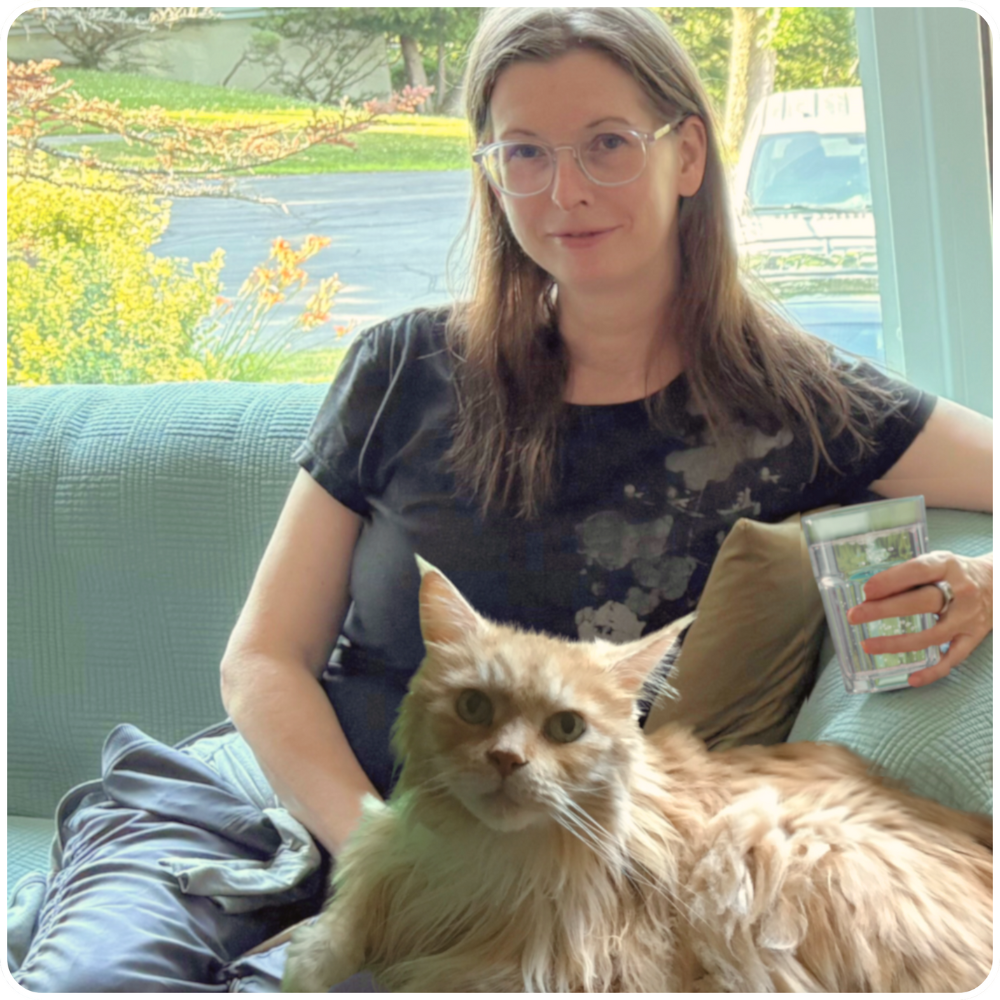- Home
- Behavior Problems
- Maine Coon Aggression
Disclosure: this site is reader-supported. When you buy through links on our site, we may earn a small commission, at no extra cost to you.
Maine Coon Aggression:
Understanding and Addressing Cat Behavior Issues
Dealing with Maine Coon aggression can be tough. Aggressive cats might hiss, bite, or scratch other pets, or worse, lash out at people.
But with the right steps, this behavior can be changed! Cat owners can train their cats to stop these actions and promote good behavior.
If you like this, you'll love our fun, free Daily Digest!

If you like this, you'll love our fun, free Daily Digest!

The Causes of Maine Coon Aggression
To address aggressive behavior, we first need to understand why it’s happening. Why is your Maine Coon kitten scratching or biting?
Every situation is different, and finding the root cause is key before taking action.
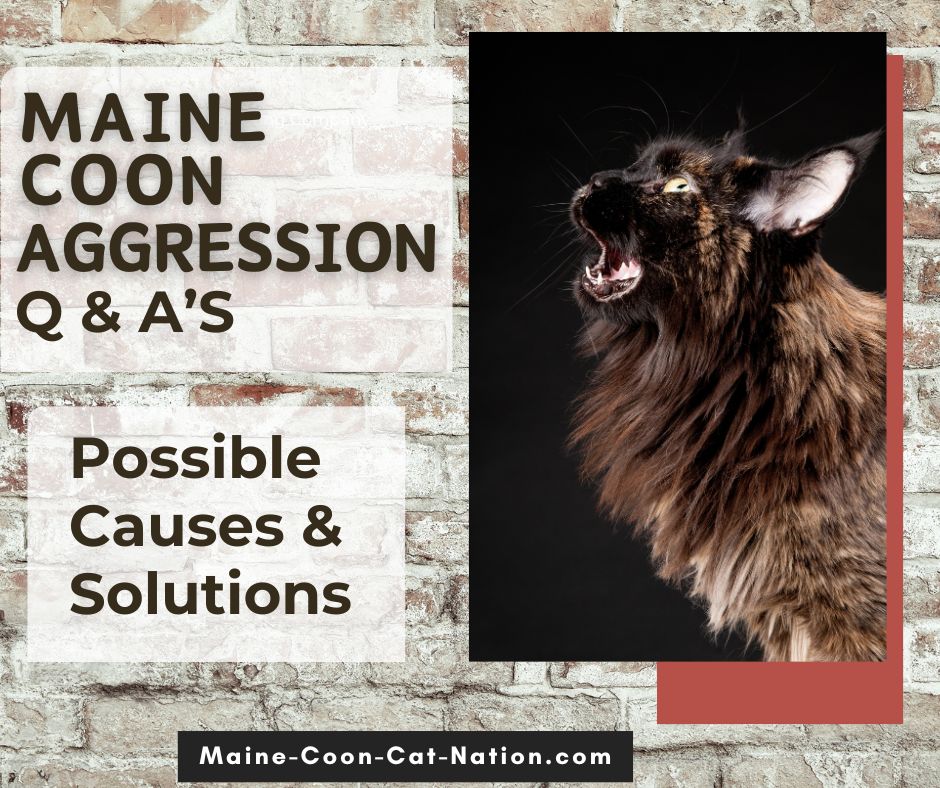
Stress
Cats can feel stress, just like people. Common causes of stress include:
- Health problems like infections
- Fleas (which make any cat grumpy)
- Moving to a new home
- Being adopted into a new family
- Introducing a new cat or pet
- A new baby in the house
- Tension in the home
If your normally calm and gentle giant starts acting out, the first step is to think about recent changes. Have they moved? Are they feeling unwell? It's possible they’re uncomfortable.
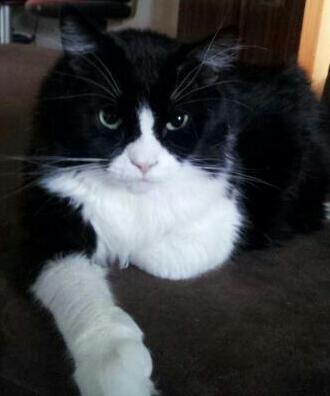
Health problems can make even the friendliest cats moody or aggressive.
If you suspect your cat is unwell, take them to the vet. Fleas can also be a big source of discomfort, so treating any flea problem may help your cat feel better and act more like their usual self.
Changes in the Home
If a recent change in your home has caused the aggressive cat behavior, training can help. Let's start with how to reintroduce pets to each other.
Reintroducing Pets
If your Maine Coon is being aggressive toward other pets, a slow reintroduction can work wonders.
- First, separate the aggressive cat. Give them their own room with food, water, a litter box, and plenty of attention. The goal is to lower their stress.
- After a few days, switch the bedding between pets. This helps them adjust to each other's scent.
- Let them see each other from a distance - about 12 feet. A quick glimpse through a crack in the door or while carrying one pet past another works well. Keep these moments brief, and always reward your cat with a treat for calm behavior.
- Gradually increase the time and decrease the distance between the pets. Keep rewarding your cat for good behavior.
Not all tension starts with aggression.
Sometimes, what begins as play between housemates can shift into conflict as young cats grow up.
If you're dealing with Maine Coons who were once bonded but are now fighting, this real story about Dakota and Emilie might feel familiar - and the practical tips added to their experience may help.
- If the aggressive cat hisses or swats, backtrack and give them more time.
- After they seem calm, try bathing both pets in the same shampoo and washing their bedding. This will make them smell alike, reducing competition.
For more advice, check out our full guide on acclimating Maine Coons and introducing them to a new home.
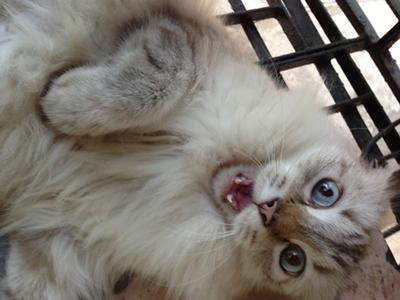
Aggression Toward People
If your cat is showing aggression toward people, it's important to address it right away.
Cats cannot be allowed to attack family members or guests. Start by trimming their claws or using Soft Claws to minimize damage.
Next, use these tools to stop Maine Coon aggression in the moment:
- A spray bottle with water
- A light tap on the nose
- Blowing on their face (which mimics a hiss)
When your cat behaves well around people, reward them with praise or treats.
Positive reinforcement encourages better interactions and helps them understand what you expect.
Maine Coon Cats: Gentle Giants
Although the Maine Coon breed is known as gentle giants, they can still occasionally show aggression.
While most are patient and loving, exceptions do exist. This is often due to their upbringing, especially if they’ve come from a less stable environment.
Rescue cats or kittens without a loving home may need extra support to feel safe.
With patience and positive reinforcement, you can help your cat overcome these behaviors.
By understanding their body language and the root cause of Maine Coon aggression, you can create a peaceful home for all your pets.
In the end, even an aggressive Maine Coon can become a happy, secure, and loving family member.
Maine Coon Aggression Reader Q & A's:
When faced with any cat behavioral problems and issues, it's always helpful to read the experiences of others!
Hopefully you can glean some insight from these community questions and answers about Maine Coon Aggression:
Aggressive Maine Coon Rescue
If a recent change in your home has caused the aggression, training can help. Let's start with how to reintroduce pets to each other.
Question: Elisabeth from Holland, OH asks:
I adopted Zetty, a Maine Coon rescue, two years ago. He's now about four years old. I'm his third owner, and while he was neutered before I adopted him, I don’t know at what age.
The vet records I received were incomplete, but it seems Zetty’s whiskers were burned as a kitten. At the shelter, I was told he was "grouchy."
Within a few months of adopting him, he attacked my feet three times, drawing blood. After the third attack, he seemed to calm down, and things improved.
Zetty became affectionate and even snuggled with me, showing the gentle giant side of Maine Coons.
But recently, after adopting a Rottweiler mix, Zetty suddenly became aggressive again, attacking both me and the dog. The most recent attack on my leg required a tetanus shot and antibiotics.
The vet thinks it's a temperament issue, and my mom says Zetty is asserting himself as the Alpha since the dog has accepted me as the pack leader.
I don't trust Zetty anymore, but I can't bear the thought of euthanizing him or rehoming him again. What should I do?
Reply:
Hi Elisabeth,
It sounds like you've had a tough time, and I'm sorry to hear that. Zetty's history likely plays a big role in his behavior. The stress of a new pet in the home might have triggered his territorial aggression.
Your question - whether to give up on Zetty - is difficult. In an ideal world, we'd say never give up. However, personal circumstances, such as children, can change the answer.
I wouldn't recommend euthanasia. Many pets thrive in homes where they're the only animal, especially after a history of being shuffled around. If that's a last resort, consider finding him a home without other pets.
In the meantime, try to re-establish your role as the Alpha. Use positive reinforcement when he shows good behavior.
Trim his claws or use claw covers to prevent injury. When he acts out, use quick corrective measures - like a spray bottle or a sharp "pssst!" - to interrupt the negative behavior.
You may also want to separate him from the dog temporarily. Gradually reintroduce them by allowing them to see and smell each other from a safe distance. Give Zetty plenty of attention during this stressful situation.
Look into stress-reducing supplements or consult a vet with experience in behavior issues. Good luck!
~Carrie
Comments:
Try another vet: It sounds like you’ve made efforts, but perhaps your vet isn’t the best fit. Some vets specialize in behavior, so consider contacting a veterinary school or local cat breeders for recommendations. There are even medications that can help with stress and aggression in cats. Good luck!
Treat-based training: I hand-feed my Maine Coon his favorite snack to build trust. I also let him approach me on his own terms, and that has reduced his territorial aggression.
Dog/cat relations: New pets can stress out a cat. Provide dog-free zones for Zetty and give him extra attention to reassure him.
Using treats near a gate or barrier can help both the cat and dog get used to each other. Create a calm, stress-free environment, and good luck!
Are All Short Haired Maine Coons Aggressive?
I rescued my cat at about 8 weeks old, and now he's almost 12. He doesn't listen at all.
When he misbehaves, I try spraying him with water, but he only stops for a second and comes right back to doing it again.
When he's in the living room, he meows a lot, jumps, and runs around. It feels weird because all the cats I know are calm and lazy. He's the opposite.
I'd like to let him sleep in my bed, but I’m worried he’ll make a mess, bite, or knock things over.
Reply:
Hi there,
It sounds like your cat is 12 weeks old, not 12 years. If so, he's displaying normal kitten behavior. Kittens have so much energy, and it takes time before they mellow out like older cats.
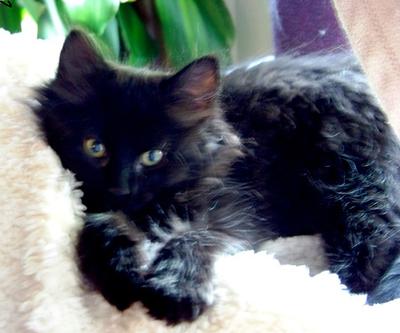
It's not unusual for kittens to run, jump, and knock things over. If you're worried about him at night, consider giving him a safe room to sleep in.
Many cat owners do this to protect both their pets and their belongings. A play session before bedtime with interactive toys will help, too.
This energetic phase will pass, and he'll become the calm companion you want. Regarding the water bottle, it's useful for more serious bad behaviors or very stubborn cats.
For now, try clapping, saying "psst!", or just picking him up and putting him down when he’s doing something off-limits. He'll eventually understand.
You mentioned he doesn't listen, which is common. Cats are more independent than dogs, so don’t expect him to always obey. It's just their natural behavior to do what they want when you're not looking.
Lastly, regarding your question about aggression and short-haired Maine Coons - first, there isn't a short-haired variety of Maine Coon cat breed.
You might have a different breed, or a mix. If he's not biting, hissing, or scratching, what you're seeing is rough play, not Maine Coon aggression.
To help manage his energy, try more interactive play sessions and consistent play times.
Early socialization is key in reducing any negative behaviors as he grows.
Best of luck with your new boy!
~Carrie
Roaring Cats
Nic from London, UK asks:
Hi Carrie,
We've had Jasper (Maine Coon) and Juno (British Shorthair) for about 9 months. We rescued them as kittens, and they used to play together a lot.
However, since getting them neutered and spayed, Jasper has changed. He’s more aloof with Juno and sometimes hisses or swats at her.
They have separate food bowls and sleeping spots, but Jasper only sleeps on the sofa or at the foot of our bed. If Juno comes near those spots, he "roars" at her like a lion.
Is this normal for a Maine Coon adolescent male, or could it be because of his neutering?
Nic
Reply:
Hi Nic,
Jasper's neutering isn't likely the cause of this behavior. Neutering typically makes cats more mellow, not more aggressive.
This sounds more like territorial behavior, which is common as cats mature. Jasper may be trying to establish his boundaries.
It's a natural part of figuring out the "pecking order." Over time, this type of behavior could ease, especially if Juno stays calm about it.
It doesn't seem like true aggression, but more a way for Jasper to assert his space.
As long as it doesn't escalate into fights, they'll likely settle into a more harmonious environment. I recommend always having a variety of toys on hand to use as a distraction, as well.
If anything else has changed in your home recently, like a new pet or routine, that might also be stressing him. Cats can be sensitive to changes.
Best of luck!
~Carrie
Maine Coon Aggression Issues
Lindsey in NM asks:
I believe my cat is a Ragdoll-Maine Coon mix. She’s about 4-5 years old and was found behind a coffee shop. She’s aggressive with people outside our family.
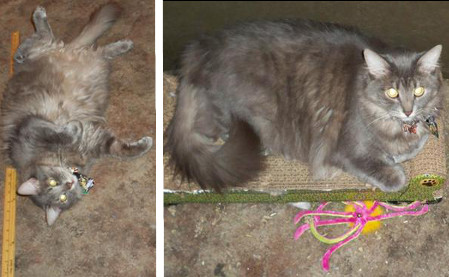
I've tried having visitors give her treats or play with her, but she either acts aggressively (biting or swatting) or sneakily attacks ankles or elbows.
She adores my husband and is always on his lap. However, she sometimes hisses or swats when we try to discipline her by simply removing her from an area.
She's very smart, does tricks for treats, and plays fetch. I want to reduce her aggression, especially toward visitors. I suspect she’s jealous of my husband's attention.
Any suggestions?
Reply:
Hi Lindsey,
It sounds like your cat is protective of your husband, which is common for female cats. It's a type of territorial behavior where she views him as "hers." This behavior may also be triggered by insufficient socialization when she was younger.
It doesn’t seem like she has underlying health issues, but since she was a foundling, she may still be adjusting to her new environment.
Most Maine Coon owners know their breed is usually laid-back, so it's likely her personality traits are a mix.
Aggression like this often stems from fear or discomfort. She may feel the need to guard her personal space.
You can help by giving her a controlled environment when visitors arrive, like a separate room with cozy spots where she feels safe.
For daily interaction, try to reinforce calm behavior. When she swats, avoid reacting with punishment.
Instead, walk away or redirect her to a toy. Fearful cats often respond best to patience and positive reinforcement.
Since she enjoys playing, incorporating interactive play sessions can help release her energy. The more she bonds with you during play times, the less she may feel the need to guard your husband. Also, avoid rough play that can encourage biting or swatting.
Keep being patient, and she'll likely settle over time. It's wonderful that she has a loving home now.
Best of luck with her,
~Carrie
Comments:
Kitty Behavior
When cats are territorial like yours, it’s best to isolate them when visitors come. Some cats hide, but others feel the need to defend their space.
Giving her a separate room with cozy spots can help reduce stress and prevent aggressive behavior.
Foundling Aggression
By: Judy
Keep up your patience. We found blowing in our Maine Coon's face worked to stop aggression. Also, the "Cesar Milan bite" trick (light pressure simulating a bite) worked in more serious cases. Good luck!
Confirmed Maine Coon Cross
By: S. Lindsey
We found her mother's owner, who left her Maine Coon to roam while away. The Ragdoll part is based on how she goes limp when picked up. She's sweet with my husband but very jealous! Thanks for the advice.
« Back to Behavior Problems
